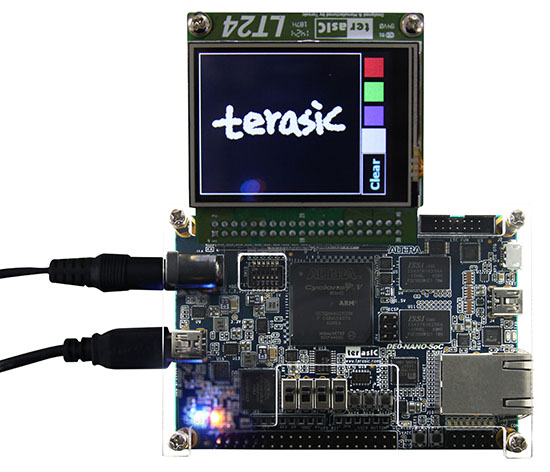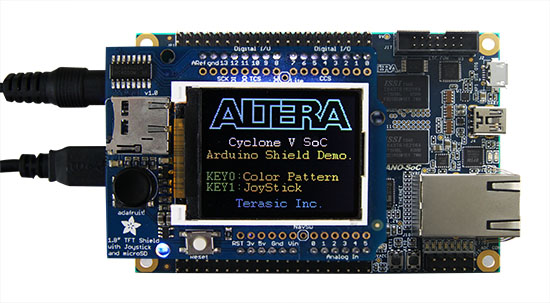DE0-Nano-SoC Kit/Atlas-SoC Kit - com vídeo
The DE0-Nano-SoC Development Kit presents a robust hardware design platform built around the Altera System-on-Chip (SoC) FPGA, which combines the latest dual-core Cortex-A9 embedded cores with industry-leading programmable logic for ultimate design flexibility.
Users can now leverage the power of tremendous re-configurability paired with a high-performance, low-power processor system. Altera’s SoC integrates an ARM-based hard processor system (HPS) consisting of processor, peripherals and memory interfaces tied seamlessly with the FPGA fabric using a high-bandwidth interconnect backbone. The DE0-Nano-SoC development board is equipped with high-speed DDR3 memory, analog to digital capabilities, Ethernet networking, and much more that promise many exciting applications.
The DE0-Nano-SoC Development Kit contains all the tools needed to use the board in conjunction with a computer that runs the Microsoft Windows XP or later.
What's different between the DE0-Nano-SoC kit and the Atlas-SoC kit?
The hardware is the same for the DE0-Nano-SoC kit and the Atlas-SoC kit. The only difference is the getting-started process for the two kits. Users can freely use the DE0-Nano-SoC kit resources on the Atlas-SoC kit and vice versa.

The DE0-Nano-SoC board has many features that allow users to implement a wide range of designed circuits, from simple circuits to various multimedia projects.
The following hardware is provided on the board:
FPGA Device
- Altera Cyclone® V SE 5CSEMA4U23C6N device
- Serial configuration device – EPCS128
- USB-Blaster II onboard for programming; JTAG Mode
- 2 push-buttons
- 4 slide switches
- 8 green user LEDs
- Three 50MHz clock sources from the clock generator
- Two 40-pin expansion header
- One Arduino expansion header (Uno R3 compatibility), can connection with Arduino shields.
- One 10-pin Analog input expansion header. (shared with Arduino Analog input)
- A/D converter, 4-pin SPI interface with FPGA
HPS (Hard Processor System)
- 925MHz Dual-core ARM Cortex-A9 processor
- 1GB DDR3 SDRAM (32-bit data bus)
- 1 Gigabit Ethernet PHY with RJ45 connector
- USB OTG Port, USB Micro-AB connector
- Micro SD card socket
- Accelerometer (I2C interface + interrupt)
- UART to USB, USB Mini-B connector
- Warm reset button and cold reset button
- One user button and one user LED
- LTC 2x7 expansion header
Block Diagram of the DE0-Nano-SOC Board

Connectivity
- Connect LT24

- Connect Arduino

What's different between the DE0-Nano-SoC kit and the Atlas-SoC kit?
The hardware is the same for the DE0-Nano-SoC kit and the Atlas-SoC kit. The only difference is the getting-started process for the two kits. Users can freely use the DE0-Nano-SoC kit resources on the Atlas-SoC kit and vice versa.



KIT
- DE0-Nano-SoC Board
- DE0-Nano-SoC Quick Start Guide
- Type A to Mini-B USB Cable x1
- Type A to Micro-B USB Cable x1
- Power DC Adapter (5V)
- 4GB microSD card (installed)






